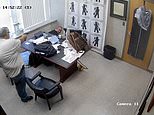Obama to put an END to NSA's huge trawl of Americans' phone records and promises that he'll phone world leaders if he wants to know something – not spy on them
- President Obama announced changes in a speech on Friday morning
- Government control of phone-call data 'creates a potential for abuse,' he acknowledged
- Obama wouldn't recommend who should control the digital information, but told AG Eric Holder and Congress to decide the future of the program
- Speech came after months-long review following a public description of the program by NSA leaker Edward Snowden in 2013
- NSA initiative is meant to stockpile data so it can be mined later to draw lines of connection among suspected terrorists after they are identified
President Barack Obama promised on Friday to end the government's access to millions of Americans' telephone call data, but launched a strong defense of the National Security Agency's performance.
In a wide-ranging speech that touched on the future of American intelligence-gathering, the 'damage' Edward Snowden's leaks have done and a snipe at Russia's feigned outrage over the revelations, he also promised that he would no longer authorize snooping on foreign heads of state.
'The leaders of our close friends and allies deserve to know that if I want to learn what they think about an issue, I will pick up the phone and call them, rather than turning to surveillance,' he said.
SCROLL DOWN FOR VIDEO

Capping a months-long review, President Barack Obama, pictured today, backed modest changes to the U.S. government's surveillance network at home and abroad while largely leaving the framework of the controversial programs in place

The lapel pin is really a microphone: Obama promised that he would call Germany's Angela Merkel and other world leaders for information in the future, instead of tapping their private calls
The move to curtail the NSA's controversial bulk phone record surveillance is the first major change to the program since it was first uncovered in 2013 when Snowden stole evidence of its existence.
Obama warned that the 'sensational' way Snowden chose to reveal what he knew will have impact U.S. intelligence and national security 'in ways that we may not fully understand for years to come.'
'The same technological advances that allow U.S. intelligence agencies to pinpoint an al Qaeda cell in Yemen or an email between two terrorists in the Sahel,' Obama said Friday morning in a speech at the Justice Department, 'also mean that many routine communications around the world are within our reach.'
'At a time when more and more of our lives are digital, that prospect is disquieting for all of us.'
And 'the combination of increased digital information and powerful supercomputers,' he acknowledged, 'offers intelligence agencies the possibility of sifting through massive amounts of bulk data to identify patterns or pursue leads that may thwart impending threats.'
'But the government collection and storage of such bulk data also creates a potential for abuse.'
Obama did not recommend whether the government, private telecommunications companies, or third-party groups should control the phone data that the government has collected, but called on Attorney General Eric Holder, Congress and the intelligence community to decide.

Major announcement: Obama trimmed the powers of the secretive US eavesdropping agency Friday by calling for new privacy safeguards, but allowed bulk phone data sweeps to continue as an anti-terror tool

Giving it back: A presidential review panel has recommended taking the data from the NSA (pictured) and giving it to the telephone companies or a third party - but the companies have balked at the idea
A presidential review panel has recommended moving the data outside of the government's control. But phone providers have balked at changes that would put them back in control of the records and expose them to new legal liabilities.
Obama strained to insist that 'the program does not involve the NSA examining the phone records of ordinary Americans.'
'Rather, it consolidates these records into a database that the government can query if it has a specific lead.'
But because of the public uproar after Snowden exposed the initiative, Obama will change the parameters of the program to limit fishing expeditions and extend the reach of skeptical judges.
'Effective immediately,' he said Friday, 'we will only pursue phone calls that are two steps removed from a number associated with a terrorist organization instead of three.'
'And I have directed the Attorney General to work with the Foreign Intelligence Surveillance Court,' the president promised, 'so that during this transition period, the database can be queried only after a judicial finding, or in a true emergency.'
While privacy advocates will cheer the announcement, Obama's decision will frustrate some intelligence officials.

Flying the flag: Obama hit out at Russia for feigning outrage over the leaks while at the same time trying to spy on the US

Coming out of the shadows: Obama promised greater transparency of the secret services
The impact of Snowden's revelations was felt in the text of Obama's speech. While he refused to directly comment on the fugitive from justice, the president lobbed broadsides at him without naming names.
'Given the fact of an open investigation, I'm not going to dwell on Mr. Snowden's actions or motivations,' he said. 'Our nation's defense depends in part on the fidelity of those entrusted with our nation's secrets.'
'If any individual who objects to government policy can take it in their own hands to publicly disclose classified information, then we will not be able to keep our people safe, or conduct foreign policy.'
He later railed against Russia, similarly without identifying the nation by name, when he complained about foreign governments that feign outrage over America's surveillance program.
Such nations, he said, 'are constantly probing our government and private sector networks, and accelerating programs to listen to our conversations, intercept our emails, or compromise our systems.'
Russian president Vladimir Putin has granted Snowden temporary asylum, allowing him to evade prosecution in the U.S. on three felony counts.
Obama's announced changes come at the beginning of a tense political year when Democrats face numerous policy obstacles and White House scandals in a bid to maintain control of the U.S. Senate, which has served as a backstop against House Republicans eager to dismantle Obama's first-term agenda – including the Obamacare law.
Shoring up the public's confidence in the NSA's spying operations with the addition of independent oversight, a White House source told MailOnline, is 'in part a move to quiet down the uproar in time for November.'

Leak: Obama said the 'damage' from Edward Snowden's leaks would be 'felt for years to come'
Officials said Friday that even after months of studying the surveillance issues, Obama was still grappling with his decisions in the hours leading up to the speech.
What appeared certain was that the NSA's phone record gathering would continue in some form, including digital data collection overseas.
'U.S. intelligence agencies will only use such data to meet specific security requirements,' Obama promised, including 'counter-intelligence; counter-terrorism; counter-proliferation; cyber-security; force protection for our troops and allies; and combating transnational crime, including sanctions evasion' – a clear warning to Iran amid concerns over its growing nuclear program.
'People around the world – regardless of their nationality – should know that the United States is not spying on ordinary people who don’t threaten our national security,' he explained, 'and that we take their privacy concerns into account.'
'This applies to foreign leaders as well,' said Obama, in a clear reference to German Chancellor Angela Merkel, whose phone was being snooped on by the NSA, according to leaks from Snowden.
'Given the understandable attention that this issue has received, I have made clear to the intelligence community that – unless there is a compelling national security purpose – we will not monitor the communications of heads of state and government of our close friends and allies.'
Digital policy analysts offered cautious praise.
Sascha Meinrath, director of the New America Institute's Open Technology Institute, said in a statement that 'many key questions and reforms were left unaddressed' by Obama, 'and many controversies punted to Congress or to other government officials. '
'To restore the trust in the United States as a responsible steward of the Internet, the president should be acting now and forcefully to take the advice of his own handpicked advisory panel, by immediately ending the NSA's collection of bulk data and supporting strong reforms.'
Most watched News videos
- Brutal moment Ukrainian soldier loses knife battle to Russian fighter
- A Kamala flub, a snub, and JD Vance snickers: Senate awkward moments
- Influencer reveals his incredible 384lb weight-loss during TV show
- Dog gets zoomies in back of moving car in NC
- Drone footage captures deadly New Years fireworks blast in Honolulu
- Lorry bursts into flames sparking motorway mayhem on the M40
- 'No!': Nigel Farage says he won't let Tommy Robinson join Reform UK
- Drone footage captures deadly New Years fireworks blast in Honolulu
- Edinburgh and its surroundings covered in snow amid cold snap
- Missouri man sends bowling ball crashing through alley ceiling
- UK set for icy and snowy weekend as Met issues Amber weather warning
- Children of sworn in senators show support for Kamala Harris






















































































